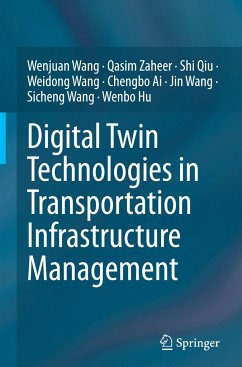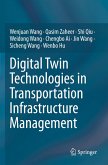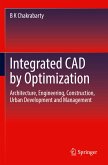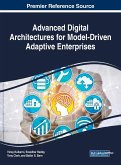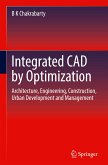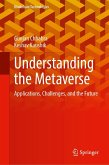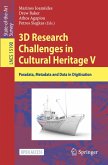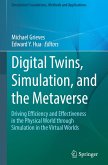Wenjuan Wang, Qasim Zaheer, Shi Qiu
Digital Twin Technologies in Transportation Infrastructure Management
Wenjuan Wang, Qasim Zaheer, Shi Qiu
Digital Twin Technologies in Transportation Infrastructure Management
- Gebundenes Buch
- Merkliste
- Auf die Merkliste
- Bewerten Bewerten
- Teilen
- Produkt teilen
- Produkterinnerung
- Produkterinnerung
This book reveals the power of digital twin technologies in terms of optimizing the performance and maintenance of infrastructure assets. From roads, bridges, and tunnels to airports and smart cities, it will guide you through the latest advances in and use cases on this cutting-edge technology. You will come to understand the challenges involved in the development of digital twins and learn about the initiatives and projects underway to overcome them. Explore the potential of this technology in terms of reducing costs, improving system performance, and enhancing the overall infrastructure…mehr
Andere Kunden interessierten sich auch für
![Digital Twin Technologies in Transportation Infrastructure Management Digital Twin Technologies in Transportation Infrastructure Management]() Wenjuan WangDigital Twin Technologies in Transportation Infrastructure Management147,99 €
Wenjuan WangDigital Twin Technologies in Transportation Infrastructure Management147,99 €![Integrated CAD by Optimization Integrated CAD by Optimization]() B K ChakrabartyIntegrated CAD by Optimization37,99 €
B K ChakrabartyIntegrated CAD by Optimization37,99 €![Advanced Digital Architectures for Model-Driven Adaptive Enterprises Advanced Digital Architectures for Model-Driven Adaptive Enterprises]() Advanced Digital Architectures for Model-Driven Adaptive Enterprises241,99 €
Advanced Digital Architectures for Model-Driven Adaptive Enterprises241,99 €![Integrated CAD by Optimization Integrated CAD by Optimization]() B K ChakrabartyIntegrated CAD by Optimization74,89 €
B K ChakrabartyIntegrated CAD by Optimization74,89 €![Understanding the Metaverse Understanding the Metaverse]() Understanding the Metaverse52,99 €
Understanding the Metaverse52,99 €![3D Research Challenges in Cultural Heritage V 3D Research Challenges in Cultural Heritage V]() 3D Research Challenges in Cultural Heritage V30,99 €
3D Research Challenges in Cultural Heritage V30,99 €![Digital Twins, Simulation, and the Metaverse Digital Twins, Simulation, and the Metaverse]() Digital Twins, Simulation, and the Metaverse53,99 €
Digital Twins, Simulation, and the Metaverse53,99 €-
-
-
This book reveals the power of digital twin technologies in terms of optimizing the performance and maintenance of infrastructure assets. From roads, bridges, and tunnels to airports and smart cities, it will guide you through the latest advances in and use cases on this cutting-edge technology. You will come to understand the challenges involved in the development of digital twins and learn about the initiatives and projects underway to overcome them. Explore the potential of this technology in terms of reducing costs, improving system performance, and enhancing the overall infrastructure experience for users. Get ready to embark on a journey of understanding the future of transportation infrastructure management with digital twin technologies.
Hinweis: Dieser Artikel kann nur an eine deutsche Lieferadresse ausgeliefert werden.
Hinweis: Dieser Artikel kann nur an eine deutsche Lieferadresse ausgeliefert werden.
Produktdetails
- Produktdetails
- Verlag: Springer / Springer Nature Singapore / Springer, Berlin
- Artikelnr. des Verlages: 978-981-99-5803-0
- 1st edition 2024
- Seitenzahl: 242
- Erscheinungstermin: 6. Dezember 2023
- Englisch
- Abmessung: 241mm x 160mm x 19mm
- Gewicht: 532g
- ISBN-13: 9789819958030
- ISBN-10: 9819958032
- Artikelnr.: 68424060
- Herstellerkennzeichnung Die Herstellerinformationen sind derzeit nicht verfügbar.
- Verlag: Springer / Springer Nature Singapore / Springer, Berlin
- Artikelnr. des Verlages: 978-981-99-5803-0
- 1st edition 2024
- Seitenzahl: 242
- Erscheinungstermin: 6. Dezember 2023
- Englisch
- Abmessung: 241mm x 160mm x 19mm
- Gewicht: 532g
- ISBN-13: 9789819958030
- ISBN-10: 9819958032
- Artikelnr.: 68424060
- Herstellerkennzeichnung Die Herstellerinformationen sind derzeit nicht verfügbar.
Shi Qiu is a distinguished professor in the School of Civil Engineering at Central South University. He is also the executive deputy director of the university's Intelligent Monitoring Research Center for Rail Transit Infrastructure. Dr. Qiu is an expert in railroad engineering, structural health monitoring, and intelligent transportation systems, and has a long history of researching the cross-fertilization of computer information technology and intelligent transportation infrastructure. Dr. Qiu performs full-scale infrastructure management by building digital twin models throughout their life cycle. He has published extensively on related topics in leading academic journals and conferences. He has also received numerous research grants from government agencies and industry sponsors to support his work. Overall, Dr. Qiu is a highly respected scholar and educator who has significantly contributed to civil engineering and infrastructure monitoring. Qasim Zaheer is a highly accomplished Ph.D. scholar and researcher, currently affiliated with the esteemed School of Civil Engineering at Central South University in China. With an unwavering dedication to the field of civil engineering, Mr. Zaheer has an extensive portfolio of academic publications, which reflect his exceptional academic credentials and research capabilities. Mr. Zaheer's current research focuses on intelligent monitoring techniques for rail transit infrastructure, and he is working under the expert guidance of Dr. Qiu at the Intelligent Monitoring Research Centre. As a Pakistani national, Mr. Zaheer brings a unique and valuable perspective to the field, and his impressive achievements continue to inspire his peers and colleagues. Professor Weidong Wang is the Dean of the Central South University School of Civil Engineering. He also serves as the Director of the Key Laboratory of Heavy Haul Railway Engineering Structures of the Ministry of Education, the Vice Director of the National Engineering Research Center for High-Speed Railway Construction Technology, and a member of the Academic Committee of the Key Laboratory of High-Speed Railway Line Engineering of the Ministry of Education. Additionally, he is the Vice Chairman of the Hunan Provincial Highway Society and the Hunan Provincial Railway Society. Professor Wang has been dedicated to researching geological hazard zoning and intelligent construction technology for rail transit. He is an expert of profound expertise in intelligent monitoring for high-speed railways, geological hazard site selection, and digital twin technology for rail transit. Chengbo Ai is an assistant professor at the University of Massachusetts Amherst, School of Civil and Environmental Engineering. He has long been working on artificial intelligence, intelligent detection of infrastructure injury and damage, and the construction of digital twin infrastructure models. Dr. Ai has published several high-level papers, has been invited to givemany talks at international conferences, and is an expert in civil engineering. Jin Wang is a postdoctoral researcher who earned his Ph.D. degree in Transportation Management Engineering from Beijing Jiaotong University. Currently, he is affiliated with the School of Civil Engineering at Central South University. For many years, he has been dedicated to research in operations research, digital visualization, simulation modeling, and algorithm design. He has profound expertise in parameterized infrastructure modeling and constructing digital twin models. Dr.Wang has published over 10 academic papers in high-level domestic and international journals such as "Computer-Aided Civil and Infrastructure Engineering" and "The Journal of Railway Science and Engineering." He has been granted 7 national invention patents. Wang Sicheng is a Ph.D. candidate in the School of Civil Engineering, Central South University, and has long been devoted to the interdisciplinary research of computer and civil engineering disciplines, with in-depth research on the whole life cycle intelligent management of infrastructure, the reliability evaluation method of railroad four-electricity project, digital twin model of rail transportation, safety evaluation and disaster simulation of railroad slope, and research of railroad slope safety evaluation method, etc. He has a deep understanding of the digital twin of civil engineering. Wenjuan Wang was born in Chongqing, China, in 1986, and received her Ph.D. degree in civil engineering from Oklahoma State University, OK, USA in 2015. She worked as a lecturer in the school of business administration at the Capital University of Economics and Business, Beijing, China from 2015 to 2018. She is an associate professor at the Capital University of Economics and Business, Beijing, China now. She has published many papers in top SCI journals including Computer-Aided Civil and Infrastructure Engineering, Journal of Transportation Engineering,Part B: Pavements, and so on. Wenbo Hu has devoted himself to conducting cross-disciplinary research between computer information technology and traditional civil engineering detection and monitoring over an extended period. He possesses a comprehensive understanding of the potential of computer science to drive innovation in the civil engineering and transportation engineering domains. By establishing digital twin models, Mr. Hu manages infrastructure across its entire life cycle and on all scales, including the collection of high-precision, multidimensional infrastructure data obtained from sensors such as laser radars and cameras. His research efforts are focused on pattern recognition, machine learning, and deep learning techniques to attain artificial intelligence evaluations of infrastructure asset management and performance status and efficiency. He utilizes theoretical modeling and algorithmic advancements of various infrastructure real-time and spatial sensing data to support decision-making in the design, construction, operation, maintenance, and asset management of core subsystems of smart infrastructure, including rail transit, municipal services, and roads. Moreover, he has built an infrastructure equipment status evaluation and fault early warning big data analysis platform that leverages equipment portrait analysis technology.
Chapter 1 Introduction to Digital Twin Technologies in Infrastructure Engineering and Management.- Chapter 2 Digital Twins Technologies.- Chapter 3 Transportation infrastructure Engineering and Management.- Chapter 4 Digital Twins in TIEM.- Chapter 5 Digital Twins in Design and Construction.- Chapter 6 Digital Twins in Operation and Maintenance(O&P).- Chapter 7 Future of Digital Twins in Infrastructure Engineering and Management.
Chapter 1 Introduction to Digital Twin Technologies in Infrastructure Engineering and Management.- Chapter 2 Digital Twins Technologies.- Chapter 3 Transportation infrastructure Engineering and Management.- Chapter 4 Digital Twins in TIEM.- Chapter 5 Digital Twins in Design and Construction.- Chapter 6 Digital Twins in Operation and Maintenance(O&P).- Chapter 7 Future of Digital Twins in Infrastructure Engineering and Management.

